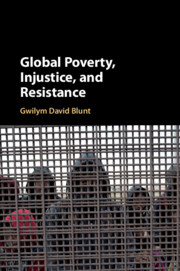Book contents
- Global Poverty, Injustice, and Resistance
- Global Poverty, Injustice, and Resistance
- Copyright page
- Dedication
- Contents
- Acknowledgements
- Introduction
- Chapter 1 Global Poverty, Justice, and Intransigent Non-compliance
- Chapter 2 The Right to Resistance
- Chapter 3 Does Global Poverty Trigger the Right to Resistance?
- Chapter 4 Illegal Immigration as Resistance to Global Poverty
- Chapter 5 Transnational Social Movements, Solidarity, and Resistance
- Chapter 6 Redistributive War as Resistance
- Chapter 7 Armed Struggle and Global Poverty
- Chapter 8 Duties of Resistance
- Conclusion
- Bibliography
- Index
Chapter 6 - Redistributive War as Resistance
Published online by Cambridge University Press: 02 December 2019
- Global Poverty, Injustice, and Resistance
- Global Poverty, Injustice, and Resistance
- Copyright page
- Dedication
- Contents
- Acknowledgements
- Introduction
- Chapter 1 Global Poverty, Justice, and Intransigent Non-compliance
- Chapter 2 The Right to Resistance
- Chapter 3 Does Global Poverty Trigger the Right to Resistance?
- Chapter 4 Illegal Immigration as Resistance to Global Poverty
- Chapter 5 Transnational Social Movements, Solidarity, and Resistance
- Chapter 6 Redistributive War as Resistance
- Chapter 7 Armed Struggle and Global Poverty
- Chapter 8 Duties of Resistance
- Conclusion
- Bibliography
- Index
Summary
This chapter argues that the case for just redistributive wars is ambiguous. It looks through the standard sufficient conditions for just war theory: there is reason to believe that the severity of global poverty is sufficient to be a just cause for war given its comparison with crimes against humanity and interpreting the definition of aggression; the question of legitimate authority is murkier, there is an acceptance that unjust state have the right to self-defence against aggressors, but the likelihood of unjust states waging a war in this context seems unrealistic; the question of last resort is difficult to assess but there is at least a case to make that in the face of intransigent non-compliance all reasonable choices are exhausted; reasonable probability of success is difficult to assess because reasonability is contingent and there are numerous examples of intuitively just wars being fought with long odds; finally, proportionality seems hard to discount even if the burdens are high, because the status quo is so onerous. The case for just war seems vaguely plausible, until it collides with reality where the asymmetry of power between affluent and poor states makes defeat inevitable for the latter.
Keywords
- Type
- Chapter
- Information
- Global Poverty, Injustice, and Resistance , pp. 156 - 181Publisher: Cambridge University PressPrint publication year: 2019

